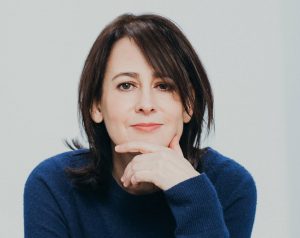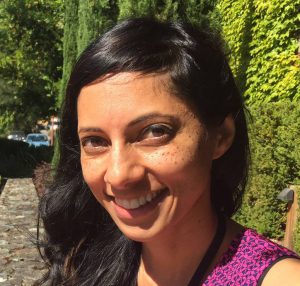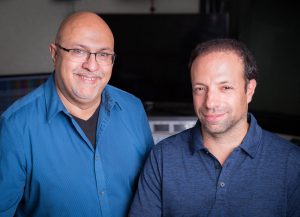Screen composing is both a deeply collaborative and solitary practice. Composers who score thrive on this ebb and flow, but when COVID-19 morphed from epidemic to pandemic, daily life and creativity transformed, too.

Lesley Barber
“Oddly, I found the forced isolation kind of freeing, as I’m a really social person,” says screen composer Lesley Barber, whose resumé includes movies like Late Night starring Mindy Kaling and Emma Thompson, the Oscar-winning Manchester by the Sea, and You Can Count on Me, with Mark Ruffalo and Laura Linney. “It was great to be able to have this time [to] just focus on my writing and stay in touch with family, friends, and colleagues, from this one location.”
Barber says the pandemic has affected her projects – one is on hiatus, another is moving forward – and changed in-person studio sessions to phone calls and online meetings involving collaborators from different time zones. All these adjustments have made her aware of how the pandemic affects her peers, on various levels. “Everyone has felt the impact of COVID – emotionally as well [as professionally] – and being attuned to where people’s heads are at, and sensitive to their lives, has been on my mind as I work with musicians,” she says.
Sensitivity to oneself and one’s community have also proven important to Amritha Vaz, who’s scored award-winning documentary features like Made In India (PBS), Little Stones, and Music for Mandela, as well as the Disney animated TV show Mira Royal Detective (2020), and apprenticed for five years with Oscar-winning screen composer Mychael Danna. Vaz confides that balancing career and family, “pulled the ground out from under my feet, and I feel like I’ve had to invent a new surface altogether.

Amritha Vaz
“Prior to the pandemic,” she continues, “I was spending 12 to 15 hours a day working to meet timelines. Without that support from [baby]sitters and teachers, it became an intense juggling act. My partner is also a creative, with a nutty work schedule. Right now, it’s important for me to balance delivering the best music I can, in the time I’m given, while being compassionate to myself and my family.”
The world’s social and political unrest, in the wake of the police killings of unarmed African-Americans George Floyd, Breonna Taylor, and so many others, was another blow for the L.A.-based composer, reinforcing her need for community – even in a moment of social distancing.
“Initially it felt like a gut punch during an already dark time,” says Vaz. “But a strange thing happened: execs and colleagues started initiating genuine conversations about politics and social change. I started to see acts of solidarity from fellow artists and friends pop up everywhere. It created a sense of connection and belonging that I’ve been missing. It provided me with some hope and inspiration. These are just baby steps towards what will need to be a massive system re-set, but I was glad to see these little shifts. I’m also leaning more heavily than usual on my composer community for support and camaraderie, especially the Composers Diversity Collective.”
For composing partners Amin Bhatia and Ari Posner – best known for their multiple-award-winning (including SOCAN Awards) work on such globally successful TV series as Flashpoint and X Company – camaraderie comes with the job. The pair recently won a second Canadian Screen Award for Anne with an E, but that momentum has been temporarily undercut by the pandemic.

Amin Bhatia & Ari Posner
“This would have been a perfect time for our agents to get out there to find us more work,” says Bhatia. “But no crew means no production means no post-production, so it’s going to be awhile. However, animation is alive and well. Ari and I are on schedule to work on the next season of Luna Let’s Go later this year, and we can’t wait.”
Some suggest that royalties from increased pandemic streaming might help offset losses from postponed projects, but Bhatia says perhaps not. “The current business structure of streaming services has been far more damaging to composers and songwriters than anything the pandemic could do,” he says. “Many composers and songwriters have seen a sharp drop in royalties, anywhere from 50% to 90% in the last two years. This is all being re-visited… so we’re hopeful a better situation can be made that will be a win-win-win for creators, distributors, and consumers. And we have a lot of time now for online meetings between SOCAN, The Screen Composers Guild of Canada, and industry partners to iron all this out as we wait for the cameras to start rolling.”
Posner says that while the cameras aren’t rolling, it’s also a good time for creative regeneration. “This is a forced slowdown, not just for the economy, but also for our nervous systems,” he reports. “If not for the concern of having to make a living and keep my family going, my body could get used to this pace. One big upside for me has been more time to sit and simply enjoy playing the piano. This has been really fun and challenging – actually practicing a whole piece of music until it’s under my fingers and I can play it with confidence, from start to finish.”

Jeff Danna
Jeff Danna – winner of three Canadian Screen Awards, 12 SOCAN Awards, and with credits ranging from Pixar’s The Good Dinosaur, to Kurt Cobain: Montage of Heck, to Terry Gilliam’s The Imaginarium of Dr. Parnassus – has a California studio that faces a beautiful and bustling street in Old Town, Pasadena. But when the state’s regional lockdowns began, the foot traffic stopped, and once the protests began, stores were boarded up – poignant reminders of dual crises. Danna, however, has kept busy wrapping up projects like Guillermo Del Toro’s DreamWorks Animation series, Trollhunters. “It was a lot of fun, really cool,” says Danna. “I was glad to have something to work on as things slowed down in our business.”
And now, as deadlines disappear for the moment, like Posner, Danna is embracing deadline-free creativity.
“The arts are a lifelong study,” he says. “I’ve got a Ravel orchestration book, maybe I can really do a deep dive on that and just keep trying to move my sense of craft and aesthetic outward. When you’re on deadline all the time, there’s a certain kind of exploratory creative process that doesn’t necessarily have a lot of room. I’m going to try and take this opportunity to go to those corners of my craft that I don’t usually go to, and see if I can push the boundaries a little bit.”